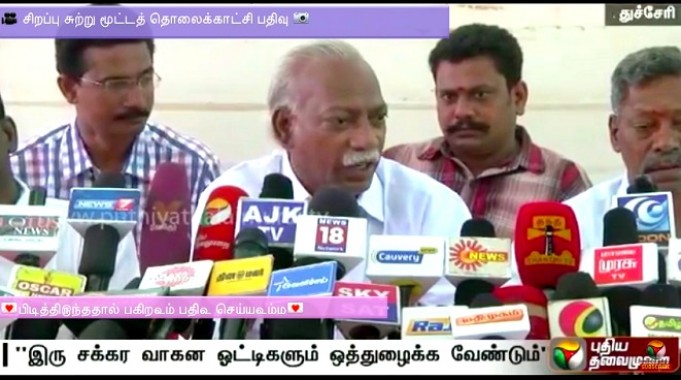Striking a false note on unions
Pix : Labour leaders on TV—rare sight.
After India gained independence in 1947 till the collapse of the Soviet Union in 1989, New Delhi was a proud member of the communist bloc. Barring a handful of senior political personalities like former Prime Minister Morarji Desai who considered the Soviet or the Chinese version of egalitarian socialism to be bogus, the Indian political class and intelligentsia wore the `Communist badge’ on their sleeves and with some pride and élan. It rubbed off on journalists too and media moghuls, albeit grudgingly, had to concede pride of place to reporters on labour and trade union activities.
Circa 1991. The Soviet Union vanished into thin air and the mixed economy model India advertised to the globe begun to fade with Prime Minister P.V. Narasimha Rao opening up the Indian economy to the outside world with Finance Minister Manmohan Singh as the torch-bearer. The fallout on the Indian media was inevitable. Overnight, coverage of trade unionism and "workers struggles" became unsexy and found itself being shunted slowly but steadily from page one to the not so visible news columns in the inside pages.
It is now rare to find stories on trade unions in the mainstream media or news about strikes. Tens of millions of public sector workers participated in a shutdown of parts of the Indian economy on September 2 in what was one of the largest industrial strikes since the famous 1974 Railway Strike. Some estimates put the figure at between 150-180 million workers going on strike. Some foreign reports called it ‘the biggest strike in human history’.
Why, then, did the Delhi Union of Journalists (DUJ), once a potent force but now reduced to an abbreviation, deem it necessary to issue a statement two days before the strike appealing to journalists to cover it? DUJ leaders expressed solidarity with the call for a general strike given by central trade unions and federations on a host of demands, and then said: “The DUJ appeals to all its members to report the strike without bias.’
The DUJ statement also said: “We recommend that all news items on the strike call focus on the genuine demands of Indian workers who are today heavily burdened by price rise, unfair labour laws and exploitative labour practices while lacking all support structures in the form of free health care and education, decent housing, clean water and sanitation and other basic needs.”
The DUJ tried to win the hearts and minds of journalists by pointing that many media organizations also do not pay minimum wages to workers and reminded them that one of the strike demands was a minimum pension of Rs 3000 for all workers.
Why was such a statement necessary? Because the tendency among some media outfits is to slam all labour agitations, particularly strikes, bandhs and rallies, and report them only as traffic disruptions. Alas what the DUJ seems to have missed is the fact that reporters can only report; they cannot ensure publication of their work. Besides the owners, the Advertisement and Circulation departments in all the major media outlets have acquired a major say on what gets in and what is left out.
Well, as it turns out, the strike did get some space in all the mainstream print media as well as the electronic media, including the web, despite the general apathy bordering on contempt towards anything related to trade unionism. But the coverage had nothing to do with the appeal of the DUJ. The focus of the reports was on how the economy would be hit and guesstimates of the loss.
Needless to say the newspaper industry was not impacted by the strike. This was a far cry from the 70’s when the printing presses would have stopped because the trade unions in the media, in solidarity with their brethren, would have respected the call to stop work.
Sadly, a section of the media sought to downplay the impact by highlighting how the banking sector was, by and large, not affected. This claim was based on the reports about the normal functioning of the State Bank of India across the country. The unions associated with the bank are affiliated to the RSS-oriented union Bharatiya Mazdoor Sangh (BMS) which was not part of the strike and was contemplating till the last minute whether or not to give a green signal to its unions in various public and private sector units to strike on the same day. But the BMS was arm-twisted by the mighty in the government into dropping the idea.
In any democracy, surely people’s voices – all people’s voices - should be heard and reported freely?
P.C.I. Babai is a Delhi-based hack.
Courtesy: Theindia.saga.com







